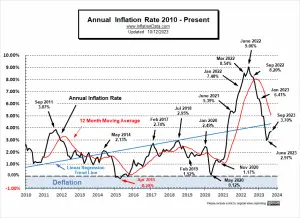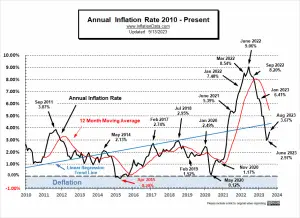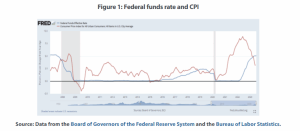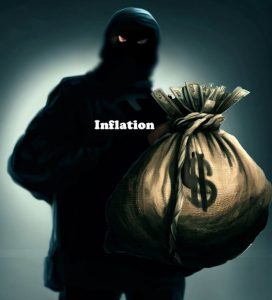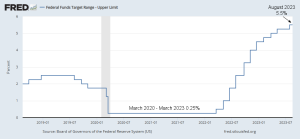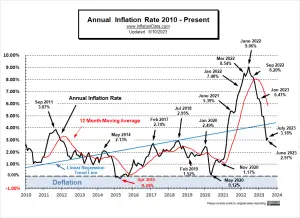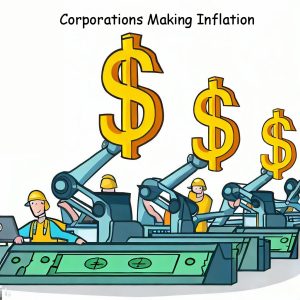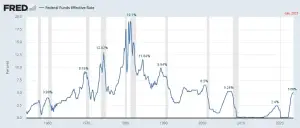According to the Bureau of Labor Statistics CPI report released on October 12th, Annual Inflation was unchanged at 3.7% in September. (but since we calculate it to two digits, it was actually up from 3.67% to 3.70%.) Monthly inflation went from 0.44% in August to 0.25% in September. But, even though monthly inflation was lower than last month, Annual inflation increased. This is because monthly inflation in September 2023 was slightly higher than monthly inflation in 2022. Thus, as the 2022 number fell out of the calculation, it was replaced by a slightly higher monthly number, thus increasing the Annual Inflation number. September 2023 Inflation Summary: Annual Inflation rose … [Read more...]
How Germany is Fudging Their Inflation Numbers
Playing with Official Inflation Statistics: An Example from Germany By Karl-Friedrich Israel The Harmonized Index of Consumer Prices (HICP) consists of 12 subindices, which are weighted according to their shares in total household expenditures. If, for example, food and non-alcoholic beverages (subindex 1) account for 15% of expenditures, they should also be given a weight of 15% in the overall index. In this way, each expenditure category would be given the importance it has for an average household. This is the claim of official statistics. But here, too, as so often, aspiration and reality diverge. In Germany, the traditionally largest subindex covers housing, water, electricity, … [Read more...]
Increasing Inflation Now Shifting Insurance Rates
Inflation is making everything more expensive, and insurance is no exception. As prices rise for goods and services, insurance companies have to adjust as well. They factor in a variety of elements, including the average cost per claim made and the rising costs involved in repairing cars or homes. When these costs go up, insurance companies must pass it on by raising the price of premiums. Understanding Insurance Inflation Insurance inflation means the cost of your car, home, health, or life insurance is going up. What’s driving these increases? For starters, healthcare expenses are rising, so health insurance gets more expensive. Natural disasters like floods and fires can also make home … [Read more...]
August 2023 Inflation Up Sharply
According to the Bureau of Labor Statistics CPI report released on September 13th, Annual Inflation increased from 3.2% in July to 3.7% in August. (but more precisely, it was from 3.18% to 3.67%.) Monthly inflation went from 0.19% in July to 0.44% in August. August 2023 Inflation Summary: Annual Inflation rose from 3.18% to 3.67% CPI Index rose from 305.691 to 307.026 Monthly Inflation for August was 0.44%, July was 0.19% and June was 0.32%. Next release October … [Read more...]
Can the FED Engineer a “Soft Landing”?
The ultimate dream of the Federal Reserve and those who believe in the FED's omniscience is for them to engineer a soft landing, i.e., curbing inflation without sending the economy into a deep recession. The idea is that if they raise rates just enough, but not too much, they can find the "Goldilocks" middle ground that will magically cool inflation just enough. In today's article, Mihai Macovei explains why that is more of a fairytale than Goldilocks herself. ~Tim McMahon, editor. There Is No Fed Magic Trick to Achieve a Soft Landing Economic growth in the United States accelerated to a 2.4 percent annualized rate in the second quarter of 2023, picking up from 2.0 percent in the first … [Read more...]
Inflation Is a Huge Wealth Redistribution Scheme
In today's article, Charles A. Smith explains how bankers and bureaucrats conspire to consistently rob the common person through inflation. We have become conditioned to believe that 2% inflation is the norm, and not only that, but it is even desirable and beneficial. Charles argues that, quite to the contrary, productivity improvements should create lower consumer prices, i.e., deflation. The reason that doesn't happen is because "Inflation makes bankers’ and bureaucrats’ lives easier and keeps them in power". ~Tim McMahon, editor. Inflation Is a Giant "Skim" on the American People The price of a McDonald’s hamburger in the United States has inflated 3.75 percent annually over the … [Read more...]
When Can We Expect Lower FED Rates?
Why Has The FED Been Raising Interest Rates? The Federal Reserve (Fed) started raising interest rates in March 2022 in an effort to combat inflation. As of the end of July 2023, the Fed's target rate limit is 5.5%, the highest level in 15 years. There are a few reasons why the Fed is raising interest rates so aggressively. First, inflation was at a 40-year high. In June 2022, the Consumer Price Index (CPI) rose 9.06% year-over-year, the fastest pace since December 1981. This means that the cost of goods and services was rising rapidly, which was eroding the purchasing power of consumers and businesses. Second, the economy is still strong. The unemployment rate posted a 50-year … [Read more...]
July Annual Inflation- Up Slightly
According to the Bureau of Labor Statistics CPI report released on August 10th, Annual Inflation increased from 3% in June to 3.2% in July. (but more precisely, it was from 2.97% to 3.18%.) Monthly inflation was 0.25% for May 2023, 0.32% in June, and 0.19% in July. July 2023 Inflation Summary: Annual Inflation rose from 2.97% to 3.18% CPI Index rose from 305.109 to 305.691 Monthly Inflation for July was 0.19%, down from 0.32% in June Next release is September … [Read more...]
Do Private Corporations Cause Inflation?
We often hear the cry that those greedy corporations are raising prices and causing inflation. If they would only bite the bullet and stop raising prices all would be well. They even have a name for it "greedflation". As recently as April 27th 2023, Bloomberg published an article entitled ECB (The European Central Bank) Wakes Up to Greedflation as Key Culprit in Price Struggle. The article tells us that French politician and President of the European Central Bank Christine Lagarde blames "corporate margins" for inflation. Today's article looks at the problems with that view. ~Tim McMahon, editor Private Corporations Don't Cause Price Inflation. Governments Do. By Daniel … [Read more...]
No Surprise… FED Raised Rate by 1/4%
The market was predicting a 1/4% raise in the FED Funds rate with 99% certainty and that is exactly what they got. We were wondering if because of last month's drop in annual inflation (due primarily to a mathematical anomaly) the FED would not raise rates this month. But apparently their previous pause was sufficient under the circumstances. By applying the slight rate increase at this point, it should present the impression to the general public that they are on top of things, when the 1/3% rebound in inflation that we expect for July shows up. FED Chairman, Jerome Powell has left the door open for further increases (or not) with his comment, “Looking ahead, we will continue to take … [Read more...]

